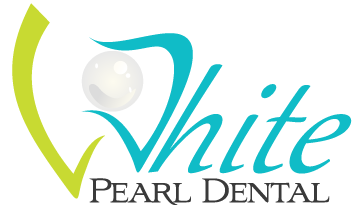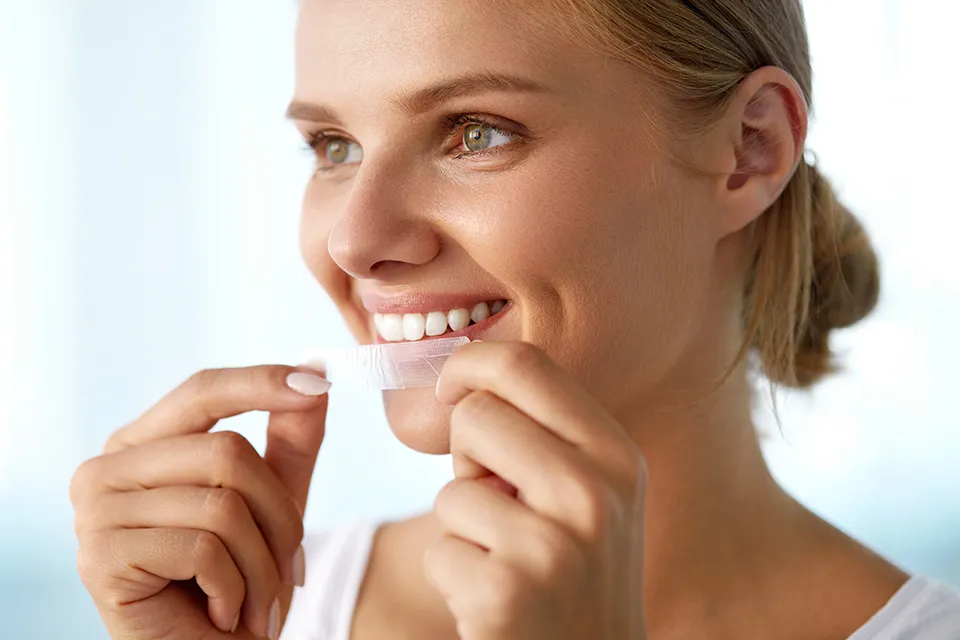The path to whiter teeth does not always necessitate a trip to the dentist for professional treatments. Utilizing naturally derived ingredients to assist in the removal of surface stains and enhancement of the overall appearance of teeth is referred to as “natural teeth whitening.” These treatments are becoming increasingly popular as individuals seek gentle, non-chemical alternatives to traditional whitening procedures.
Opting for natural teeth whitening methods can be beneficial for several reasons. Not only are these procedures more cost-effective and accessible, but they are also gentler on the teeth and gums, lowering the risk of sensitivity and irritation.
Furthermore, natural whitening methods complement your overall dental health regimen by incorporating ingredients that enhance oral hygiene.
What Are the Best Natural Teeth Whitening Methods?
Exploring natural remedies can provide a number of choices for tackling teeth discolouration. Here’s how popular agents work their magic:
Baking Soda
Baking soda, also known as sodium bicarbonate, is a mild abrasive that successfully removes surface stains on teeth. When used correctly, it can polish away discoloration without damaging the enamel. Furthermore, its alkaline nature helps to neutralize acidic conditions in the mouth, decreasing the growth of harmful bacteria.
Hydrogen Peroxide
Numerous commercial whitening products usually contain hydrogen peroxide as a bleaching agent. When used in low concentrations, it can safely lighten teeth stains. Its efficiency is due to its ability to penetrate the enamel’s porous surface and break down stain compounds. Nonetheless, precautions must be taken to avoid possible enamel erosion and gum irritation.
Coconut Oil Pulling
This traditional method is swishing a tablespoon of coconut oil in your mouth for 15-20 minutes. It’s believed to remove toxins and improve oral health, which can indirectly contribute to whiter teeth. The theory is that oil pulling can remove bacteria and plaque from your teeth surfaces, which are the primary causes of discoloration.
Apple Cider Vinegar
Apple cider vinegar contains acetic acid, which has antimicrobial properties and may help in whitening teeth. Its effectiveness as a natural whitening agent is due to its ability to kill bacteria and dissolve stains. However, due to its acidic nature, it should be used sparingly to prevent enamel erosion.
Activated Charcoal
Activated charcoal is known for its detoxifying properties. Its porous structure helps it absorb plaque and microscopic tidbits that cause staining. While some people find it useful for whitening, it is crucial to use it gently to avoid harming the enamel.
Strawberries
Strawberries contain malic acid, an enzyme that helps whiten teeth by eliminating surface stains. When mashed up and applied to the teeth, strawberries may offer a mild whitening effect. However, their acid content means they should be used in moderation.
Lemon and Salt
The combination of lemon juice and salt produces a natural bleaching paste. Lemon juice contains citric acid, which can help break down stains, whereas salt serves as a gentle scrub. Yet, like other acidic treatments, this method must be used cautiously to protect the enamel.
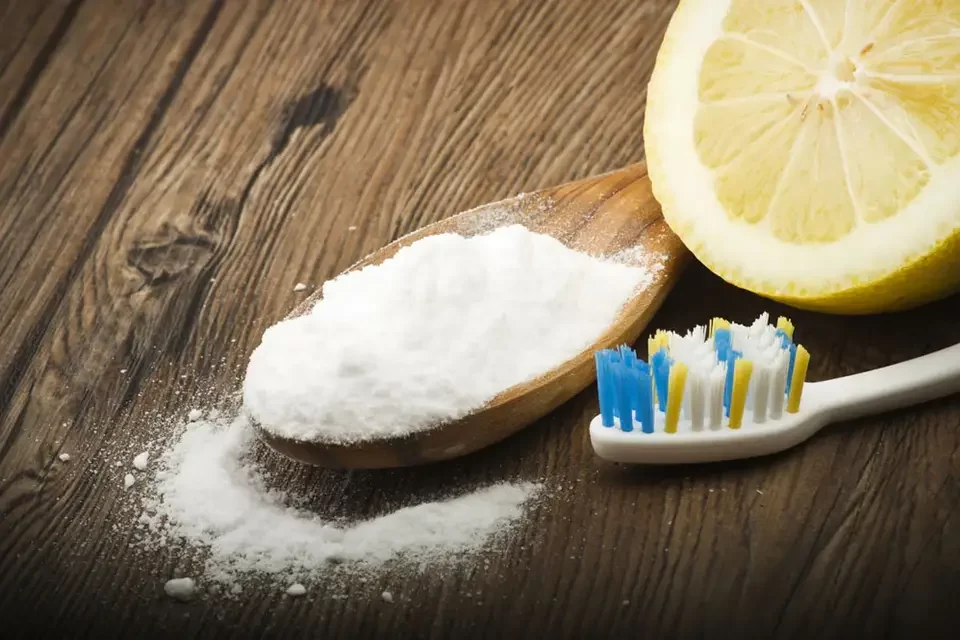
Turmeric
Turmeric is highly valued for its anti-inflammatory and medicinal properties. When used in a paste form on teeth, it can provide a mild whitening effect. Despite its brilliant yellow colour, turmeric does not discolour teeth and can be an interesting addition to natural oral care practices.
Oil Pulling with Other Oils
Oil pulling with sesame or sunflower oil is also practiced beyond coconut oil. This approach has similar purported benefits, including eliminating bacteria in the mouth and possibly aiding in teeth whitening.
What Are the Benefits of Natural Teeth Whitening?
There are numerous benefits to using natural teeth whitening methods, including:
Gentler on Teeth and Gums
Natural procedures are less likely to produce sensitivity and irritation than chemical whitening treatments, making them a safer option for those with sensitive teeth.
Less Expensive than Professional Whitening Treatments
Many natural whitening solutions use ingredients that you may already have at home, providing a less expensive option to professional treatments.
Can be Done at Home
The convenience of natural teeth whitening is unbeatable. There is no need for special appointments if you incorporate these approaches into your weekly or daily oral care practice.
Can Help Improve Overall Oral Health
In addition to assisting in the whitening process, ingredients such as baking soda and coconut oil can promote improved oral hygiene by combating plaque and bacteria.
Some Other Benefits
Choosing natural whitening methods also means adopting a more eco-friendly and holistic approach to dental care, which is consistent with a lifestyle which promotes natural wellness.
Are There Any Risks to Natural Teeth Whitening?
While natural teeth whitening methods provide numerous advantages, you should approach them with caution:
How Natural Teeth Whitening Can Cause Tooth Sensitivity
Overuse of acidic or abrasive ingredients can wear down enamel over time, increasing tooth sensitivity and susceptibility to decay.
Can All Stained Teeth Be Whitened?
Natural tooth whitening treatments are not effective for all types of discolouration. As an example, professional treatment may be necessary for intrinsic stains resulting from trauma, specific medications, or genetic factors.
Does Natural Teeth Whitening Damage Teeth?
Gum irritation and enamel damage can result from the improper or excessive use of even natural substances. It’s crucial to follow guidelines and use moderation.
How to Choose the Right Natural Teeth Whitening Method?
Choosing the best natural teeth whitening method depends on several factors:
Consider the Cause of Your Teeth Discoloration
Understanding whether your stains are extrinsic (surface) or intrinsic (within the tooth) will help you select the most effective treatment.
Choose a Method That is Gentle on Your Teeth and Gums
Choose treatments that lower the risk of enamel damage and gum irritation.
Start with a Low Concentration and Gradually Increase as Needed
This approach can minimize potential side effects while gauging effectiveness.
Be Patient and Consistent with Your Treatment
Natural remedies may require more time to provide visible results than professional treatments. Consistency is essential.
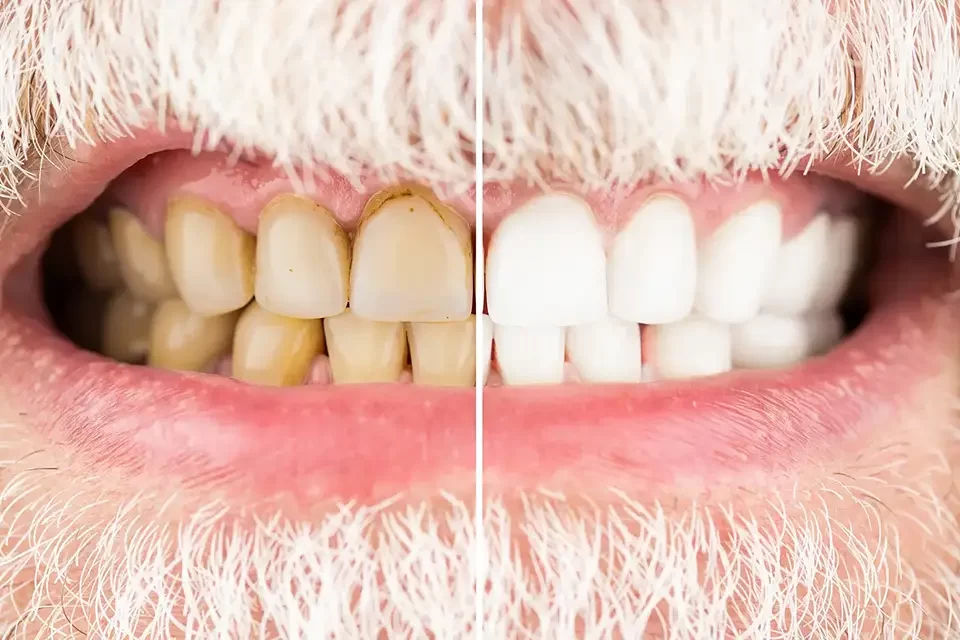
What Are the Main Causes of Tooth Discoloration?
Tooth discoloration can affect anyone, diminishing the brightness of your smile. Several factors contribute to this issue, classified into extrinsic, intrinsic, and age-related categories. Understanding these can guide you toward the right whitening solutions.
Intrinsic Factors
Intrinsic stains dwell within the tooth, making them more challenging to tackle. These may stem from genetic factors that dictate enamel thickness and natural coloration. Certain medications, especially tetracycline antibiotics during teeth formation stages, can lead to deep-set stains. Dental trauma that damages the inner structure of the tooth also contributes to intrinsic staining, altering colour from the inside.
Extrinsic Stains
Extrinsic stains are surface-level blemishes that affect the enamel. Dietary habits and lifestyle choices often cause them. Consuming colour-rich foods and drinks like coffee, tea, and wine or engaging in smoking can leave behind noticeable stains on your teeth. Regular oral hygiene can mitigate these effects but might not eliminate the discoloration.
Age-Related Changes
Natural aging plays a significant role in tooth discoloration. Over time, enamel wears down, becoming more transparent and allowing the dentin’s yellowish hue to surface. This process is accelerated by cumulative exposure to both extrinsic and intrinsic staining factors throughout one’s life.
Best Natural Teeth Whitening Products of 2024
Numerous products on the market use natural whitening agents, including:
Teeth Whitening Toothpaste
Regular use of these toothpastes, which contain activated charcoal and baking soda, can assist in the removal of surface stains.
Teeth Whitening Gel
You can use gels containing natural bleaching agents such as hydrogen peroxide directly on the teeth to achieve whitening results.
Teeth Whitening Strips
Some strips contain natural whitening agents and provide a convenient approach to target stains.
Teeth Whitening Mouthwash
Mouthwashes containing hydrogen peroxide or herbal extracts can improve oral hygiene while also whitening teeth.
Teeth Whitening Kits
Comprehensive kits may include a combination of the above products, providing a multi-faceted approach to natural teeth whitening.
How to Prevent Teeth Discolouration?
Maintaining your newly whitened smile involves several vital practices:
Brush and Floss Regularly
Maintaining good oral hygiene is the primary preventive measure against teeth staining. Regular brushing and flossing help to remove plaque and particles that might cause discolouration.
Limit Your Intake of Staining Foods and Beverages
Coffee, tea, red wine, and certain fruits can stain teeth. Limiting exposure or rinsing your mouth after consuming these items can help prevent staining.
Avoid Smoking
Tobacco use is a primary cause of teeth discolouration. Quitting smoking can dramatically improve the colour of your teeth and overall dental health.
See Your Dentist for Regular Checkups and Cleanings
By removing surface stains and tartar buildup, professional cleanings help maintain the health and brightness of your smile.
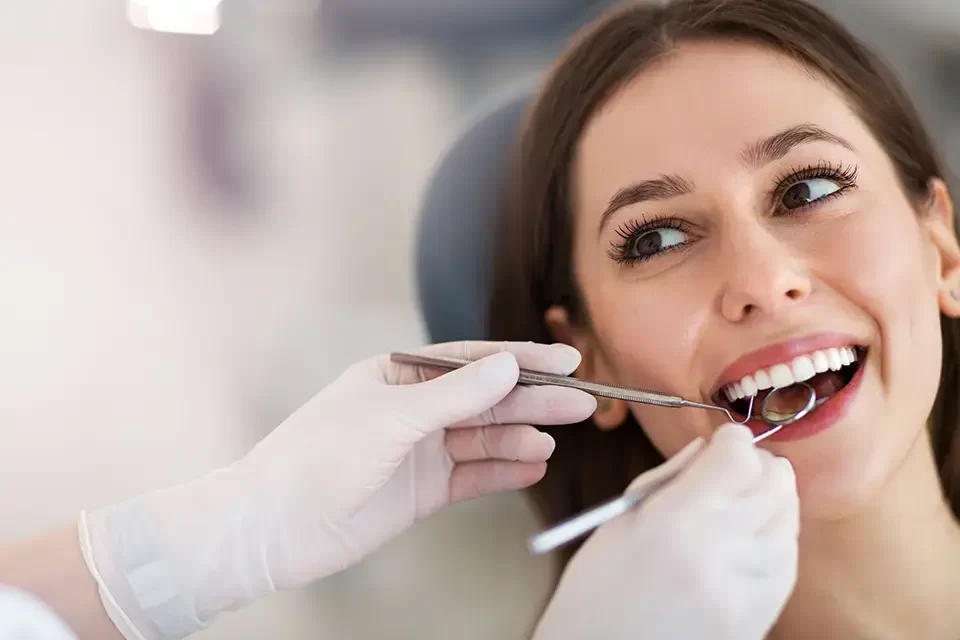
Frequently Asked Questions about Natural Teeth Whitening
How Long Does It Take to See Results with Natural Teeth Whitening Methods?
The time it takes to see results depends on the method employed, the initial level of staining, and individual factors, including diet and oral hygiene practices. Some people may see results in a few weeks, while others may need to be patient and consistent over months.
What Are the Best Natural Teeth Whitening Practices for Daily Oral Care?
Including natural whitening agents in your everyday routine, such as baking soda toothpaste or oil pulling, can help keep your smile looking bright. Brushing and flossing on a regular basis, as well as avoiding stain-causing foods and beverages, is essential.
Are There Any Dietary or Lifestyle Changes That Support Natural Teeth Whitening?
Yes, maintaining a diet low in staining foods and beverages, increasing your intake of water, and consuming foods that promote saliva production (such as crunchy fruits and vegetables) can support natural teeth whitening efforts.
Are There Age Restrictions for Using Natural Teeth Whitening Methods?
While most natural methods are safe for adults, parents need to consult a dentist before using these treatments on children. The developing enamel of young teeth can be more susceptible to damage.
Final Reflections
Natural teeth whitening offers a promising path for those looking to brighten their smile without harsh chemicals or expensive treatments. Understanding the benefits and risks of these approaches allows you to make informed decisions that are consistent with your oral health goals.
Our teeth whitening service at White Pearl Dental, is ready to guide you through your dental health journey, giving you the tools and knowledge you need to attain a dazzling, healthy smile. Remember that consistent care and a holistic approach to oral health are essential for achieving a beautiful smile.
